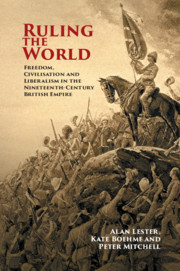Lester, Alan, Kate Boehme, & Peter Mitchell. Ruling the World: Freedom, Civilization and Liberalism in the Nineteenth-century British Empire. Cambridge: Cambridge University Press, 2021.
Writing true global history is exceedingly hard. As we mentioned in our book club discussion of November 2021, covering such an expansive topic is almost inherently beyond the capabilities of a single author’s scope or work ethic. This problem often results in the compartmentalization of global history, either through collaboration (with each contributor focusing on their own specialization) or simply tying one’s own specialization into larger themes while still essentially writing a limited history. Studies of the British Empire often fall into this same trap; any history of the Empire is necessarily a history of the world, and so historians like to break it down into manageable provincial chunks. Enter Ruling the World.
As Alan Lester notes in his introduction to this fascinating text, a provincial approach to British Imperial history has the added downside of making it seem like key administrative and military players were only considering one event at a time, as they only enter these histories when they are involved with the subject matter at hand. In reality, in Lester’s words, the empire was governed “everywhere and all at once,” with crises demanding attention simultaneously and, more often than not, influencing the responses to each other and subsequent events. The empire was, after all, a more-or-less unified geopolitical entity, all managed from its metropole in London. In service of this (surprisingly) radical new approach to imperial historiography, Lester and his colleagues propose considering three “snapshot” years as case studies for imperial administration, examining the actions, decisions, and prioritization of ruling the largest empire the world has ever seen at different key points in its development.
When I had finished Lester’s introduction, I could not contain my excitement for what seemed to be a history that spoke to all my own reasons for studying global history (and drifting away from more niche studies). In all manner of ways, my initial expectations were fulfilled. Ruling the World has become my new standard for analyzing and characterizing the nineteenth-century British Empire. Lester et al.’s case studies of 1838, 1857, and 1879 offer fertile ground for understanding how the British perceived each stage of their empire, how their perception of indigenous and white settler rights evolved, and the overriding motives of profit and cultural chauvinism that give lie to contemporary and modern claims that the British Empire was somehow an enlightened force for spreading civilization and liberalism around the world. It also shines a spotlight on the particular methods through which that empire was actually governed, down to the offices and locations of specific governmental departments and how bureaucratic quagmire, consolidation, and ultimately cooperation led to a more efficiently and centrally governed empire by the end of the century.
At the same time, however, I couldn’t help feeling slightly disappointed as I finished the closing pages of Ruling the World. Intellectually, Lester et al. had done a terrific job, but I never truly felt like they had put me in the mindset of any of their main players, dealing with things everywhere and all at once. Part of this is inherent to writing; while the empire might have been ruled everywhere and all at once, one cannot write a coherent book that way. Certain colonies and events are prioritized, while others that offer less exciting dispatches are only briefly mentioned. By focusing on seminal years of crisis, Ruling the World also really only offers a picture of the empire at its most frantic (though it does offer admirable context to make sense of all its subjects). The choice to conclude in 1879 also deprives readers of learning how this evolving imperial apparatus dealt with a new era of renewed expansion, especially in Africa, and how the lessons of the nineteenth-century empire do or do not apply to that of the twentieth.
These objections are, admittedly, rather minor, and indeed some of them move beyond the authors’ intended scope for their work. Ruling the World remains a fantastic piece of imperial history and, in my opinion, should offer a model to others for both writing and teaching such world-spanning organisms. It will certainly be guiding my own approach to the subject in the future, and I look forward to any future projects the members of this team may bring about.
